Key takeaways:
- Language barriers can lead to misunderstandings but can also foster creativity and deepen connections through non-verbal communication and simplification of language.
- Effective conversation skills, including active listening, summarizing, and asking open-ended questions, enhance understanding and build stronger relationships.
- Real conversational practice, such as engaging with diverse groups or participating in language exchanges, significantly boosts confidence and cultural comprehension.
- Personal experiences of overcoming language barriers emphasize the importance of encouragement, vulnerability, and creativity in the language learning journey.
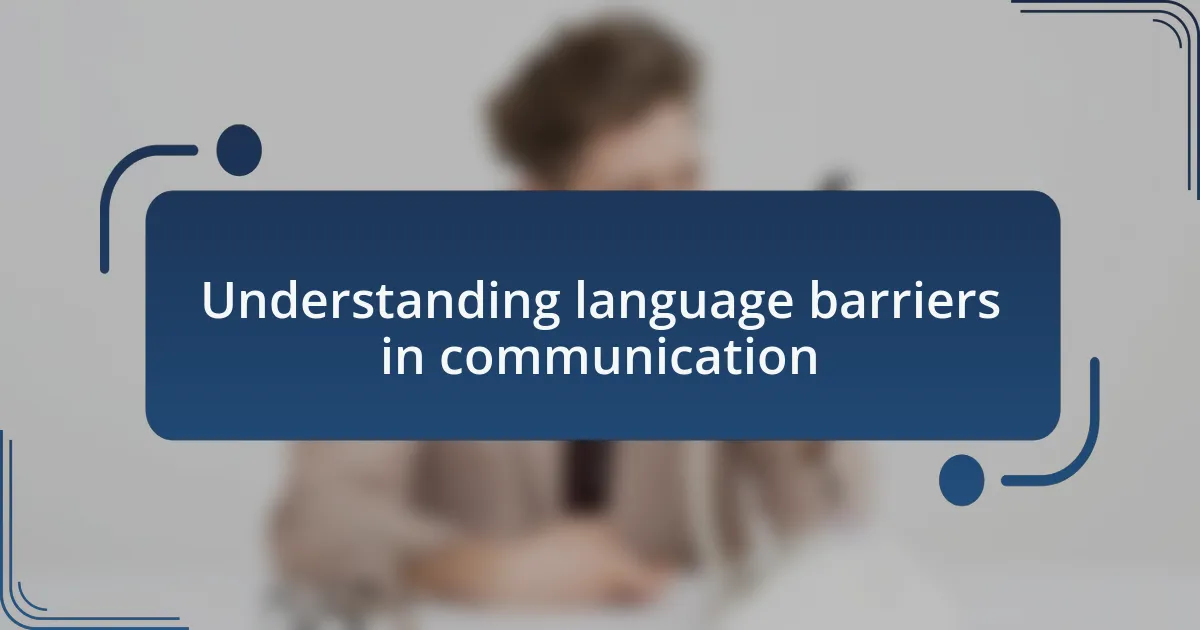
Understanding language barriers in communication
Language barriers in communication often manifest as more than just vocabulary differences; they represent a profound disconnect in understanding. I vividly remember a conversation in a coffee shop where my attempts to convey a simple idea became a dance of gestures and frustrated smiles. Isn’t it remarkable how something as basic as language can create such complex challenges in human interaction?
In my experience, language barriers can lead to misinterpretations that evoke anxiety and uncertainty. There was an instance when I misunderstood a critical instruction at work simply due to an accent. How did it feel to navigate that situation? It was unnerving, but it taught me to appreciate the nuances of tone and articulation, which often play a significant role in conveying meaning.
Moreover, I’ve realized that these barriers can also draw people closer together. In a diverse group, I remember watching individuals collaboratively sketch their thoughts as an alternative to speaking. What if, instead of viewing language limitations as hindrances, we embraced them as opportunities for creative expression? This shift in perspective can transform our interactions and enrich our understanding of one another.
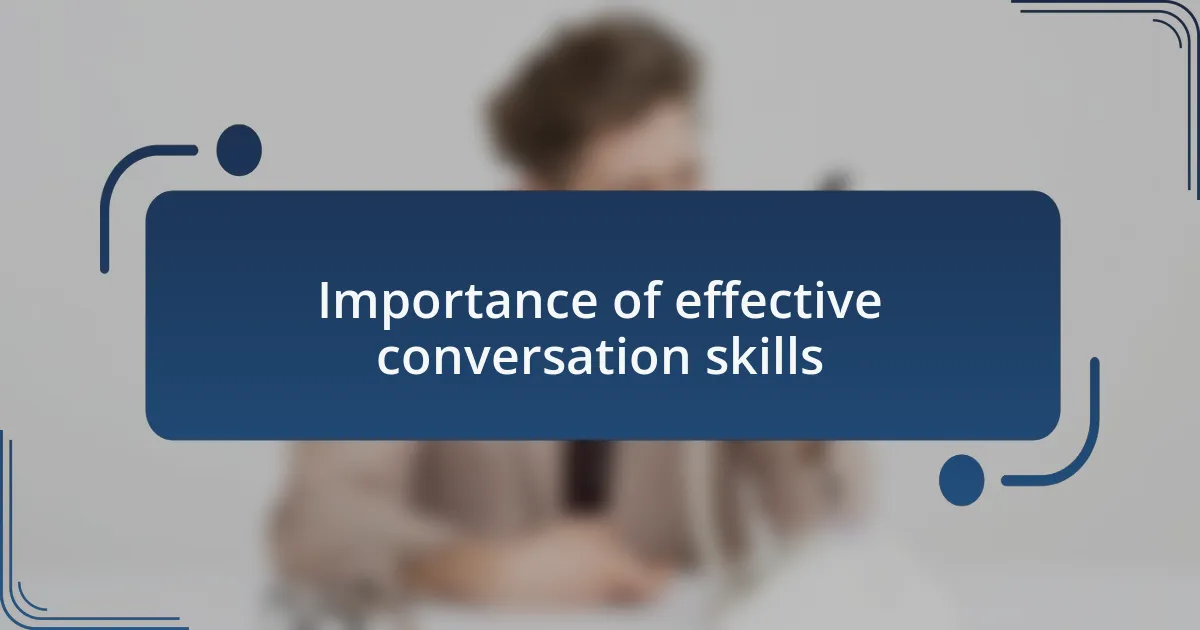
Importance of effective conversation skills
Effective conversation skills are essential for building meaningful connections. I recall a networking event where I struggled to follow a discussion with a group of international professionals. It struck me how much clearer communication can foster relationships, often bridging cultural gaps and creating camaraderie.
Without the ability to converse effectively, misunderstandings can easily arise. There was a time when I hesitated to participate in a group discussion, fearing my language might not convey my point accurately. That experience highlighted for me the anxiety that can accompany poor communication, reminding me of the confidence and warmth that effective conversation can inspire.
Moreover, it’s fascinating how conversational skills can empower individuals. I remember a mentoring session where I saw a colleague transform their perspective by simply expressing themselves clearly. This made me reflect: isn’t it incredible how a few well-chosen words can lead to profound change? Mastering conversation not only enhances personal expression but can also uplift others in their learning journeys.
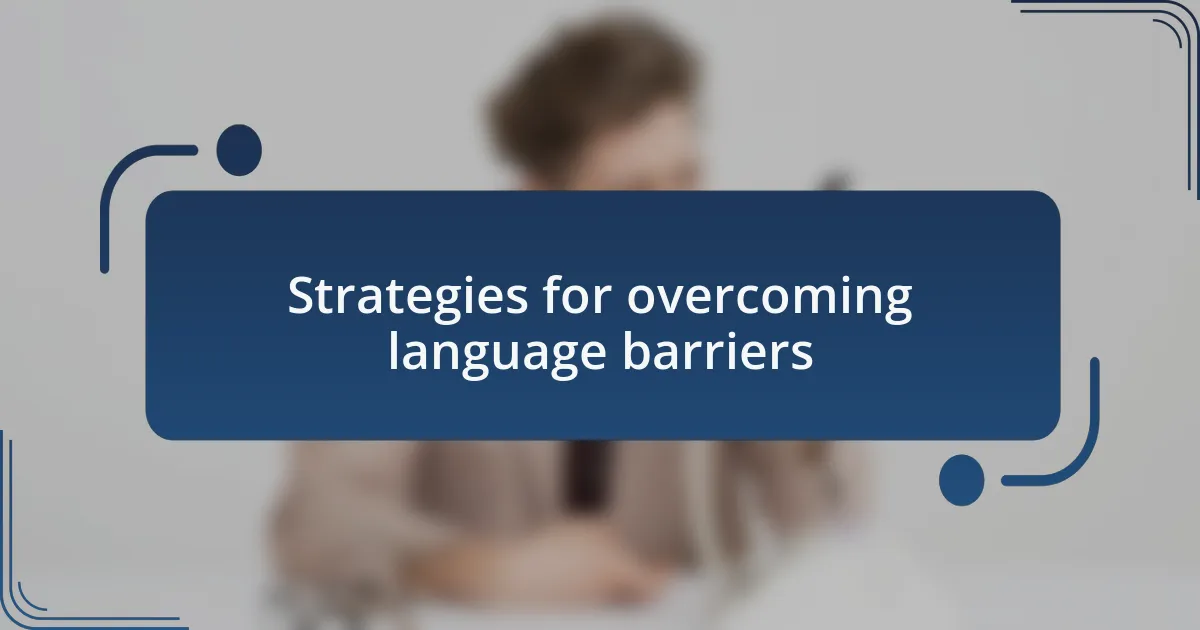
Strategies for overcoming language barriers
One effective strategy I found helpful in overcoming language barriers is to embrace active listening. During a recent conversation with a colleague from Brazil, I focused intently on their tone and body language, which provided context that words sometimes couldn’t convey. It made me realize how attuned we can become to subtle cues, allowing us to grasp meaning beyond language itself.
Another tactic I’ve leaned on is simplifying my language without compromising the message. One time, at an international conference, I noticed how many participants were overwhelmed by complicated jargon. By breaking down my thoughts into simpler terms, I could see participants’ eyes light up with understanding. It left me wondering: isn’t it rewarding to connect with others when we shift our perspective?
Visual aids can be game-changers too. I remember a workshop where instead of relying solely on verbal explanations, I used diagrams and images to illustrate my points. The difference was palpable. It made me think about how we can all benefit from a little creativity—what if we all became more visual in our communication?
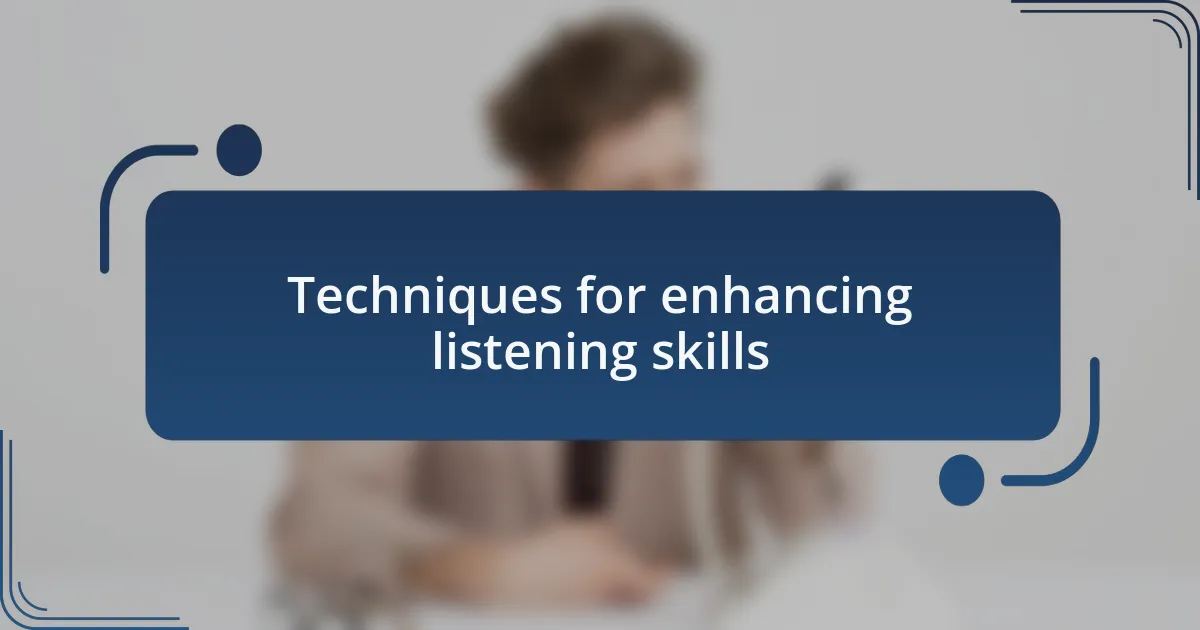
Techniques for enhancing listening skills
To truly enhance listening skills, I’ve discovered the power of summarizing what others say. During a discussion with a friend about their experiences traveling abroad, I made it a point to paraphrase their words back to them. It not only reinforced my understanding but also showed them that I genuinely cared about their story. Have you ever noticed how this simple technique can boost connection?
Another valuable approach is maintaining eye contact, which, from my experience, signals attentiveness. I once participated in an informal meeting where the atmosphere shifted dramatically just because everyone was actively looking at one another. It made the conversation feel more engaging, and I found myself truly absorbing their insights. Isn’t it fascinating how non-verbal cues can enhance our listening and foster a sense of belonging?
Lastly, I learned that asking open-ended questions can deepen conversations and encourage others to share more. During a recent chat with a new acquaintance, I sought to dig deeper by asking them about their motivations rather than settling for surface-level responses. This technique not only made them reflect but also enriched my perspective. How often do we miss out on these deeper conversations simply because we don’t ask the right questions?
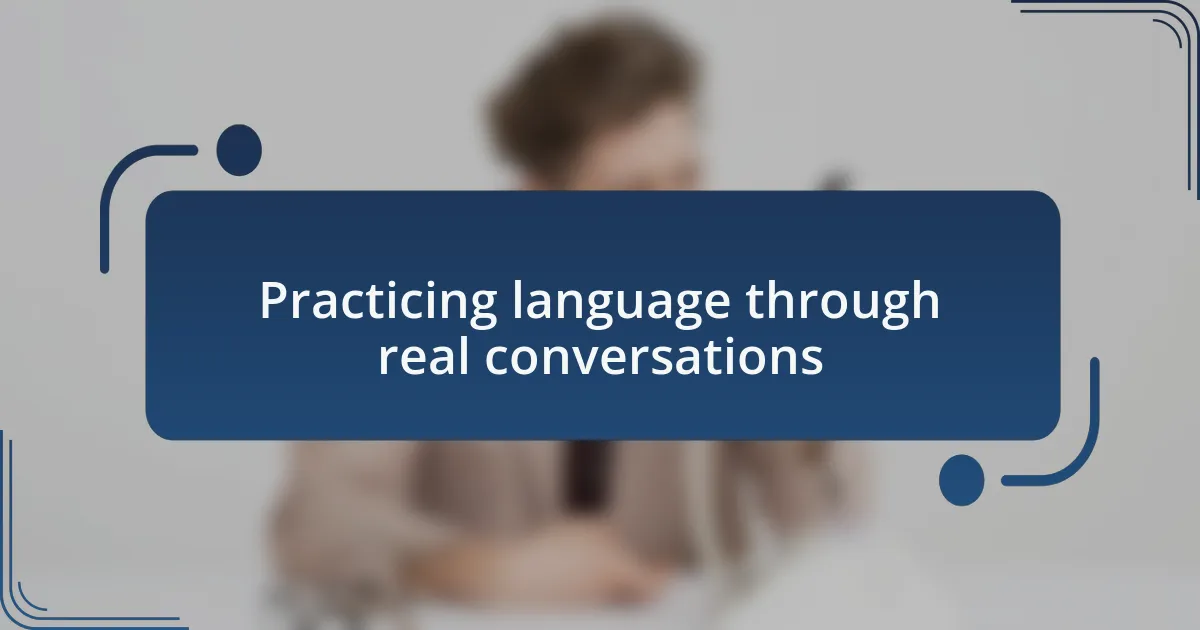
Practicing language through real conversations
Practicing language through real conversations holds immense value, as it allows for dynamic exchanges that textbooks simply can’t replicate. I recall a time when I met a group of international students at a local café. Speaking with them in a casual setting not only boosted my confidence but also helped me grasp colloquialisms and cultural nuances that aren’t often taught in classrooms. Have you ever felt the thrill of connecting through shared laughter in another language?
One memorable experience was when I volunteered at a community center and led discussions in English with newcomers. It pushed me out of my comfort zone; the need to communicate effectively meant I had to think on my feet. The joy of seeing someone’s face light up when they understood or responded correctly in English was a profound reminder that language isn’t just about words; it’s about connection. Isn’t it incredible how those moments can deepen our appreciation for another language?
Finding opportunities to engage in conversations can also be as simple as joining a local language exchange group. I’ll never forget my first session; it felt a bit intimidating, but as we shared stories and practiced speaking, I quickly realized that everyone was there to learn from each other. Those interactions helped me not only improve my language skills but also forge friendships rooted in shared experiences. How often do we overlook the simple joy of learning together in an informal setting?
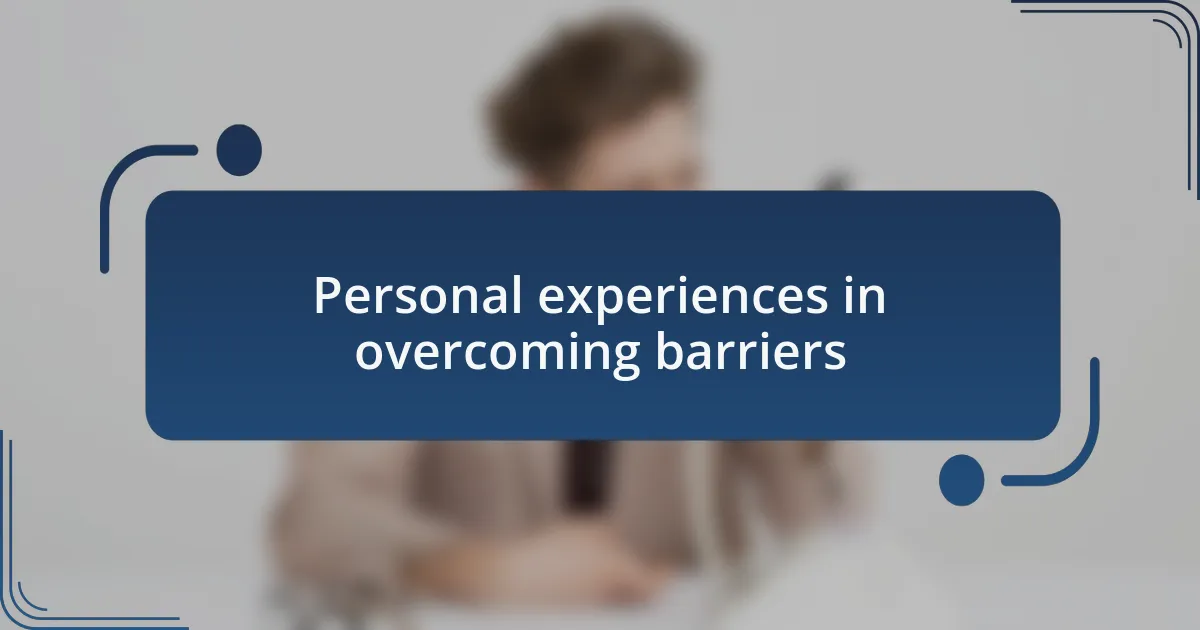
Personal experiences in overcoming barriers
In one instance, while traveling abroad, I found myself in a bustling market, surrounded by animated vendors speaking a mix of languages. I felt overwhelmed, yet I remembered my goal: to communicate. With just a few phrases and a big smile, I asked for local delicacies. The vendor’s laughter and enthusiasm were infectious, and that interaction not only led to a delightful exchange but also a newfound appreciation for the power of gestures and tone. Have you ever realized how much can be conveyed without perfect words?
When I took part in a cultural exchange program, we had a dinner where speaking the dominant language was expected. Initially, I sat quietly, feeling lost in the conversation. However, as I listened and absorbed the warmth of the atmosphere, I began to engage by asking simple, open-ended questions. The incremental progress was exhilarating; I noticed that with each little contribution, I overcame my insecurities. Have you ever felt how small steps can lead to significant breakthroughs in communication?
Another memorable experience unfolded during a volunteer stint at a language support group. The moment I paired up with someone struggling with their accent, something shifted within me. It wasn’t just about correcting pronunciation; it was about sharing encouragement and fostering a safe space. Each time they spoke a sentence and smiled at their improvement, I experienced a sense of pride that reinforced my belief in the importance of supportive dialogue. Has nurturing someone else’s growth ever made you reflect on your own journey?
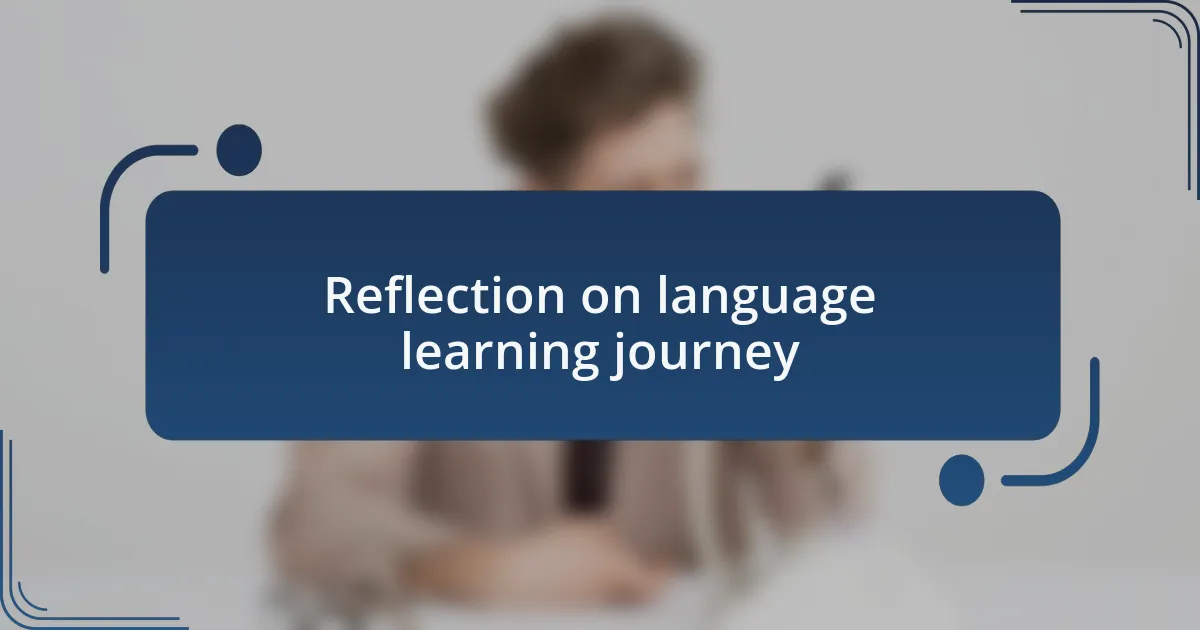
Reflection on language learning journey
Reflecting on my language learning journey, I often find myself revisiting the times I stumbled over words while trying to express my thoughts. I vividly remember sitting in a café abroad, desperately searching for the right vocabulary to ask for directions. Frustrated, I thought I might give up, but then I smiled and used hand signals instead. That moment taught me that sometimes, creativity and enthusiasm can bridge the gap more effectively than words alone.
There was also a time when I struggled with speaking more than writing in my target language. I attended a weekly meetup, where everyone was encouraged to speak up. Initially, my heartbeat quickened each time it was my turn, but I decided to treat those moments as opportunities for growth. I realized that every hesitant word I uttered was a stepping stone toward greater fluency. Have you ever noticed how vulnerability in communication can lead to profound growth?
One particularly impactful experience occurred during a language immersion weekend. While trying to express complex ideas, I stumbled into misunderstandings that sparked laughter rather than frustration. Through that laughter, I embraced imperfection and recognized that making mistakes is not only acceptable but a crucial part of the learning process. Isn’t it fascinating how every misstep becomes a memorable lesson in our journey?